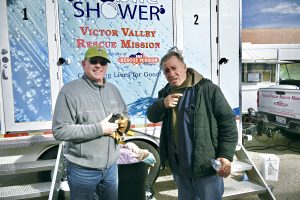VOLUNTEER PROVIDES PERSPECTIVE AND ENCOURAGEMENT TO THOSE IN NEED

Al mans the mobile shower trailer on Wednesdays, offering our neighbors on the streets an opportunity to get clean and ask for help.
When Al Barnett volunteers at the Mission, he officially is a driver. He drives the mobile shower unit over to its Wednesday spot by the Mission, and sets up shop for the many who will visit that day for a hot shower, a meal, and other services. But what he’s really doing is making a connection.
“Just being with people, just loving them right where they are at, in the midst of their mess, it’s an honor,” Al said. “And it comes with a great deal of responsibility. I’ve been groomed for it—my testimony has groomed me. To be able to sit with them and be relevant... I can connect with them, so they trust me.”
Al grew up in the San Gabriel Valley in the 60s. The household was full of violence, verbal and physical. “I was noticing that most everybody’s parents were divorcing, so the prayers were to bring mommy and daddy back together. My prayers were the opposite—separate them so the pain goes away.”
Al focused on athletics, excelling in basketball. His paternal grandparents introduced him to Christ. “I grew to love Jesus at a very young age,” he said. “I loved reading the Bible.”
During Al’s senior year of high school, he and his beloved high school sweetheart’s relationship ended. “It devastated me,” said Al, who was headed to college on a basketball scholarship. “I left and went to this very liberal school, played ball, and joined a fraternity—that really catapulted addiction.
“I had such a need to be needed. I wanted to fit in, and in the late 70s, that meant drugs.”
Al dropped out of school, working odd jobs and selling drugs. “I got really heavy into drugs,” Al said. “I got six DUIs in two years—three were in California and three were in Arizona. My saving grace was that the computers weren’t linked.”
Al went into sales and started making more money. He got married and they had a son. “I was working, making good money, bought a home—we were living the dream,” he said. “But she didn’t know about my addiction.” The family moved to the High Desert. “I kind of floundered around here for a bit,” he said. “I had fallen away from the Lord. I loved him, but I wasn’t obedient.”
When the family found Crosswinds Community Church, there was a shift. “It was the biker church, the recovery church—it was for messed-up people. That’s where I met Bill (Edwards, Director of the Mission). This is where it really began to change for me. God began to strip away the flesh.”
Al stopped using drugs, and in 2000, he stomped out his last cigarette. A year and a half later, he quit drinking. Al’s son flourished in the church, and the family was happy. In 2008, when his son went off to college, Al warned him about drugs. “He fell right into it, even though I told him to watch out,” Al said. “He was so talented, a worship leader, happy. If you lined up 100 kids, he’d be the last one you’d think would get into drugs.”
Al’s son left college. He’s been in 14 programs and has been living on the streets for years. “We loved him every inch of the way, and never gave up on him.”
Al’s wife battled cancer for years. At the end of her fight in 2021, she was able to see her son sober. He was doing well in the Teen Challenge program. Al’s wife died in his arms when she was just 63. Shortly after, his son was back on the streets.
After taking time to grieve, Al reached out to Bill. “I said, OK Lord, time to pick myself up,” he said. “That’s when I got involved. God just put us together.” On Wednesdays, Al and the team provide 35 to 50 showers and 120 to 200 meals to those in need. Cosmetology students provide haircuts, and others come with tablets to help with services.
“It’s so natural for me—I was such a mess myself,” Al said. “I just ask people if they’re OK, and then shut up and listen. I ask if they are done with this and do they want to make some changes... sometimes it’s ‘No.’ I just say, ‘Fair enough. Let me know.’”
On the road to recovery, there are a lot of touchpoints. “I’ve heard it compared to links on a chain,” Al said, describing how many people can have an influence on someone before they get the help they need. “Rarely am I privileged to be that last link, where someone gives their heart to the Lord. It’s an honor to be a link on that chain. And hopefully they get to that place where they receive Christ. Then it really begins.
“You don’t give to get, you get to give. It’s a byproduct that you’re blessed. Sometimes people think that you’re coming in and saving the day, but really God is often using them to minister to us.”
